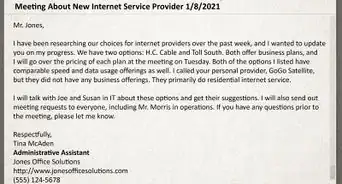This article was co-authored by Lauren Krasny. Lauren Krasny is a Leadership and Executive Coach and the Founder of Reignite Coaching, her professional and personal coaching service based in the San Francisco Bay Area. She also currently coaches for the LEAD Program at Stanford University Graduate School of Business and is a former Digital Health Coach for Omada Health and Modern Health. Lauren received her coaching training from the Coach Training Institute (CTI). She holds a BA in Psychology from the University of Michigan.
wikiHow marks an article as reader-approved once it receives enough positive feedback. In this case, several readers have written to tell us that this article was helpful to them, earning it our reader-approved status.
This article has been viewed 166,188 times.
One of the most common reasons employees quit their jobs is because of a difficult boss. If you find yourself in a situation where you find it nearly impossible to work with your boss, then it's time to take action to improve your relationship, or to think about further steps to take if you feel that the situation is out of your control. If you focus on being constructive and on keeping your cool, you may be surprised by how easy it is to handle a difficult boss after all.
Steps
Improving Your Relationship
-
1Talk to your boss about it. You may feel like the absolute last resort is to actually talk to your boss about the problems you're having, but that's where you're mistaken. If you really want to improve your relationship with your boss instead of waiting for things to get worse, then the best thing you can do is ask your boss if you can schedule a time to talk and be honest about your feelings while maintaining your professionalism. Once you have face time with your boss, make eye contact, speak clearly, and let him or her know what the problem is.[1]
- Make sure you focus on how your problem is with working with your boss, not your actual boss or some aspect of his or her personality. Talk about how you're having trouble communicating, which is making it more difficult to meet objectives, or say something else about how you're struggling to meet deadlines because of changing expectations. Frame the conversation so it sounds like you want your company to succeed, which can only happen if you and your boss work better together.
- It's important to choose your words carefully. Avoid any personal attacks that may offend your boss, and focus on discussing your work.
- Picking a time to talk in advance will keep your boss from being caught off guard and will give the situation the seriousness that it deserves.
-
2Work with your boss instead of against him or her. If you really want to improve your relationship with your boss, then you should work with your boss to improve the state of your company, instead of against your boss. Though it may feel good to make your boss look stupid at a meeting or to send a passive-aggressive email to your boss, in the long run, this won't do any good for your relationship and it won't make you feel any better. Furthermore, making your relationship with your boss even worse will make it harder to get your work done, and at the end of the day, nothing is more counterproductive than that.[2]
- Help your boss achieve his goals by being helpful, present, and supportive. Even if he's difficult to deal with, your life will be easier if you move with the grain instead of against it.
Advertisement -
3Keep track of all of your conversations. Keeping track of all of your conversations, whether it's through emails or memos, will help you be on top of your situation with your boss. Doing so will be helpful for two reasons. First, having a record or everything your boss said will help you in the event that your boss gives you confusing instructions or claims he or she didn't say something that he or she really said; you can use the written communication as evidence. Second, having a record of everything your boss says to you can be helpful if your relationship is so problematic that you want to discuss the situation with a supervisor; in that case, you'll have written proof that something is off.[3]
- If you're really struggling to communicate with your boss, then try to make sure that all of your communication happens in front of someone else, so that you have evidence of what happened if your boss tries to deny it.
- Document everything that you feel is relevant to your concerns with your boss. You may want to purchase a pocket planner so that you can enter the issues on the appropriate dates. Keep this private. You don't want to pull put the planner and scribble notes in front of him because that will cause more anger. You are keeping notes for your own sake, so that you have all your concerns backed up with facts.
-
4Anticipate problems before they come up. Another way to improve your relationship with your boss is to keep an eye out for problems that may arise, and to react to them with preparation and forethought. If you know that there was a bad traffic accident on the freeway and that your boss is going to come in late, try to delay the meeting until he gets there, or start it off for him. If you know your boss is going to be angry after meeting with a difficult client, give him or her some space instead of bringing up something upsetting, which may start an argument.[4]
- If you know that your boss has difficulty accomplishing a certain task, try to keep yourself relatively free so you can be there to help out.
Maintaining the Right Mindset
-
1Refrain from becoming emotional during any discussions with your boss. Even if your boss becomes emotional, you want to maintain your professional manner so that he cannot use anything against you. Note that your boss may become even more aggravated by your calm and professional demeanor, and if this is the case, explain to your boss that you would like to continue the conversation, but the last thing you want is to upset him, so suggest picking up the issue at a later time. If you lose your cool, your boss can blame you, even if you’re upset over something completely legitimate.[5]
- If you find yourself getting emotional in the middle of a conversation, excuse yourself and ask to resume the conversation at a later time.
- If you hear yourself raising your voice, stop, slow down, and take a few deep breaths. If you can’t keep the conversation at a normal level, then you should resume it later.
-
2Be prepared to discuss criticism of yourself when approaching a difficult boss with concerns. Of course you have issues that you may want to discuss personally, but if he feels that you are criticizing him, he may turn the tables and place the focus on you. If this is the case, be professional. Listen to his concerns and tell him that you appreciate his feedback and that you will work on the issues, and then politely return to the problems you have. Don’t get defensive or ignore anything he is telling you.
- In fact, it can be helpful to ask yourself if you’re doing everything you can correctly before you start a conversation with your boss. You may be having problems with your boss because you have been doing something wrong without realizing it. It’s best to anticipate anything your boss might say, such as the fact that you’re always late or that your reports need to be proofread more, before you start the conversation. Otherwise, you may be taken aback.
- Don’t interrupt your boss and wait for him to finish giving his feedback. You don’t want him to think that you’re above listening to him.
- A difficult boss will be at their worst when you've made a major mistake, but you may be able to partly salvage the situation by handling failure at work with honesty and integrity.
-
3Understand that you cannot change your boss. If your boss is characteristically difficult to handle, not just for you but for others, then the likelihood of him changing is minimal. If this is the case, use the opportunity to simply make him aware of your issues. At least he cannot say that he was never informed of your concerns. Though you can’t change your boss or his personality, hopefully talking to your boss will send him on the path to improvement. Furthermore, you can work on improving your relationship without changing your boss.[6]
- You and your boss may just not be compatible as people. If this is the case, then you’ll have to find a new way to operate together unless you feel like you have exhausted all of your resources. Sometimes, you may have to accept your differences first before you move on.
-
4Remain professional when confronting your boss, even if you feel your blood boiling. Maintain a calm demeanor and be prepared to listen to any gripes or lectures that he or she may want to share with you. Don’t use vulgar language or personal attacks, and don’t be lewd or say anything you would say if you were fighting with a close friend. Remember that you have a professional relationship with this person, not a personal relationship. Even if your boss starts being unprofessional, don’t use that as an excuse to follow suit.[7]
- If you have something specific to say to your boss, you may even want to write it down or rehearse it first to make sure that it comes off as professional. You don’t want to start saying something and then realize that you’re stepping out of your bounds halfway through your conversation.
-
5Do not go over your boss’s head if you can avoid it. Not only will this cause hostility between you and your boss, but your boss’s boss may refer you back to your boss, which may result in an even more unreceptive situation. You should go over your boss’s head if you feel like you have tried everything with your boss but nothing has worked. Additionally, you can go over your boss’s head if you feel that your boss is being sexually inappropriate, discriminating against you based on your age, gender, race, or another external factor, and that further action needs to be taken outside of your boss’s power.
- If you go over your boss’s head at the first sign of a conflict, then you will cause irreparable damage to your relationship. If you can try talking to your boss before talking to someone else, it can save your relationship, as well as your happiness at work.
Taking Further Action
-
1Talk to your supervisor if it’s necessary. If you feel like you have tried everything on your own and need to talk to someone higher up, then it’s time to arrange a meeting with a supervisor to discuss the problems you’re having with your boss. There’s no point in delaying the inevitable if you feel like you really can’t work together with your boss. If you’ve tried everything and know that your relationship has reached a dead end, then it’s time to talk to your supervisor about the situation. Don’t be nervous, and stick to discussing the facts instead of getting emotional. The more concrete examples you have, the more respect you’ll get.
- Make sure you use professional language and avoid bad-mouthing your boss in front of your supervisor. You don’t want to say something that makes your supervisor lose respect for you, too. Remember that you want to look like the calm, reasonable one, and that your boss is the one who has been causing all the problems.
-
2Take action if you feel you’ve been discriminated against. If you truly feel that you’ve been discriminated against because of your age, race, gender, or something else beyond your control, then it may be time to take action. You can consult the EEOC for free, or seek out an employee attorney for a fee if you think you’ve been discriminated against and are in a protected class. Don’t be nervous about taking this measure if this is what’s happening; though it won’t be pleasant, this may be the best way to meet your needs.
- If you’ve witnessed fraud at your company and want to take action, remember that the False Claims Act requires you to first file your claim before you disclose it publicly.
-
3See if you can be transferred within your company. One option that isn’t as extreme as leaving your company but which can make you a lot happier at your workplace is to see if you can be transferred to a different department, or even transferred to a different boss. If you’re truly having trouble with your boss and your supervisors or other people at the company completely understand where you’re coming from, then they may be willing to accommodate your needs. If you make it pretty clear that you won’t be able to stay on if you’re stuck with your current boss, in spite of how much you like the company, then they may be able to find an arrangement that makes you happy.
- Of course, all of this depends on your workplace culture and if such arrangements are typically — or even occasionally — made at your workplace. Do your research and see if such a thing has been done before, and look out for tips on how to proceed. Of course, you should try to find this out without letting everyone know about the particular situation you find yourself in.
-
4Decide whether it’s worth it to leave your workplace. Unfortunately, when it comes to today’s job market, good jobs can be few and far between, depending on the industry you’re working in. Before you decide to go on the job market again or to leave your current company, you should ask yourself if it’s really worth it for you to make this change. If your job is causing you mental and physical pain and you really feel like you can’t be there another day and keep your sanity, then it may really be time to leave. However, if you’re just mildly annoyed or frustrated, you may want to hold off, or you may want to explore your options before you resign.
- Of course, if your boss is being inappropriate, discriminating against you, or doing other unreasonable things, then there’s no question about it: you have to leave.
- Ideally, you should be able to look for new work while maintaining your current position. Being employed will make you a more appealing candidate for other companies.
-
5Do your research carefully before you take another job offer. Though you may be bursting at the seams to leave your current work situation, you have to diligently do your research before you take a new offer. If you’re too desperate to leave, you may jump at the chance to work at a new company, even if it ends up not being a good fit. You could end up at a company with a boss who is even more difficult (though this may be hard to imagine now), and will only make your own working life even worse. It’s important to take the time and to make sure that you’re leaving a hostile environment for a comfortable one before you make the transition.
- As you interview for a new position, make sure you talk to other people at the company and get a strong sense of what your new boss will be like before you accept an offer. Though you won’t know 100% what your new boss or job will be like until you start working there, you should follow your gut to see if something is off.
- Though you may be rushing to take on a new offer because it’ll mean you will have to spend less time at your current job, resist the temptation to take something that doesn’t feel quite right just because it means you’ll get to leave your current difficult boss. Tell yourself that it’s a worthy time investment to search for a place where you can truly be happy in the long run.
Expert Q&A
-
QuestionHow can I figure out why my boss and I don't get along?
 Lauren KrasnyLauren Krasny is a Leadership and Executive Coach and the Founder of Reignite Coaching, her professional and personal coaching service based in the San Francisco Bay Area. She also currently coaches for the LEAD Program at Stanford University Graduate School of Business and is a former Digital Health Coach for Omada Health and Modern Health. Lauren received her coaching training from the Coach Training Institute (CTI). She holds a BA in Psychology from the University of Michigan.
Lauren KrasnyLauren Krasny is a Leadership and Executive Coach and the Founder of Reignite Coaching, her professional and personal coaching service based in the San Francisco Bay Area. She also currently coaches for the LEAD Program at Stanford University Graduate School of Business and is a former Digital Health Coach for Omada Health and Modern Health. Lauren received her coaching training from the Coach Training Institute (CTI). She holds a BA in Psychology from the University of Michigan.
Executive, Strategic, & Personal Coach First, it's important to figure out the context of the disconnect. Are the requests inconsistent with company policy? Do you feel unappreciated? Are your deadlines reasonable? Do you feel overwhelmed with your workload and need help? Once you figure out what's causing the friction, you'll have a much easier time addressing the problem.
First, it's important to figure out the context of the disconnect. Are the requests inconsistent with company policy? Do you feel unappreciated? Are your deadlines reasonable? Do you feel overwhelmed with your workload and need help? Once you figure out what's causing the friction, you'll have a much easier time addressing the problem. -
QuestionWould sharing my personal life with a difficult boss help, or will he just take advantage of me?
 Community AnswerDo not share any of your personal life experiences with your supervisor. Your supervisor is not your friend. Keep things professional. If things are shaky between the two of you already, sharing personal information will give them access to information that wasn't on a need-to-know basis and could be used as leverage against you.
Community AnswerDo not share any of your personal life experiences with your supervisor. Your supervisor is not your friend. Keep things professional. If things are shaky between the two of you already, sharing personal information will give them access to information that wasn't on a need-to-know basis and could be used as leverage against you. -
QuestionHow do I deal with a boss who never sees anything I do as right?
 Community AnswerLook at the criticism as your boss teaching you through their eyes. Take whatever criticism they have to offer, kind and unkind, and use it to apply a new style to your work. It will be more difficult to complain about your work if your work is tailored to your boss's standards. You might also want to consider sitting down with your boss and asking what exactly you can do to improve your work in their opinion.
Community AnswerLook at the criticism as your boss teaching you through their eyes. Take whatever criticism they have to offer, kind and unkind, and use it to apply a new style to your work. It will be more difficult to complain about your work if your work is tailored to your boss's standards. You might also want to consider sitting down with your boss and asking what exactly you can do to improve your work in their opinion.
References
- ↑ Lauren Krasny. Executive, Strategic, & Personal Coach. Expert Interview. 27 March 2020.
- ↑ Lauren Krasny. Executive, Strategic, & Personal Coach. Expert Interview. 27 March 2020.
- ↑ http://www.techrepublic.com/blog/10-things/10-ways-to-deal-with-a-bad-boss/
- ↑ http://www.forbes.com/sites/margiewarrell/2014/01/20/6-strategies-to-hanhandldling-a-bad-boss/
- ↑ http://www.psychologytoday.com/blog/cutting-edge-leadership/201201/how-deal-difficult-or-bullying-boss
- ↑ Lauren Krasny. Executive, Strategic, & Personal Coach. Expert Interview. 27 March 2020.
- ↑ Lauren Krasny. Executive, Strategic, & Personal Coach. Expert Interview. 27 March 2020.
About This Article
If you’re stressing over how to handle a difficult boss, try talking to them directly about your issues, focusing on your working relationship and not their personality to avoid offending them. If possible, anticipate problems before they come up by avoiding your boss when you suspect they’ll be angry or being available when you know they’ll have work for you. When there’s a problem, maintain a professional attitude and try not to become emotional, even if your boss does. If things don’t improve and the relationship gets worse, bring the issue to a supervisor. For advice on what to do if you’ve been discriminated against or sexually harassed, keep reading.












































































